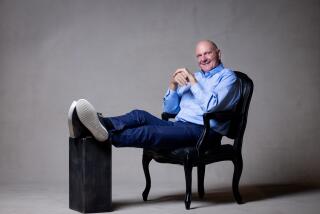Why I hope Donald Sterling fights the NBA to the last gasp
Few things are as disgusting as the sight of a big business enterprise swaddling itself in morality and sanctimony, proclaiming its high ethical standards.
I’m looking at you, NBA.
The National Basketball Assn. has been showered with praise for the foursquare response of its newly minted commissioner, Adam Silver, in the Donald Sterling case. Silver has banned the Los Angeles Clippers owner from any contact with the team or league for life and is asking the other owners to vote to end Sterling’s ownership.
But as we’ve pointed out, Sterling would have the option to go down fighting -- in court, if necessary.
Please let it be so.
Make no mistake, I don’t think Sterling is an appropriate owner of a major league sports team. Yet that’s been evident for decades, or almost since the day he acquired the then-San Diego Clippers in 1981. But a nasty fight over the Clippers ownership may be what it takes to really turn this case into a teachable moment. The teachings won’t make the NBA look good.
To suggest that the league’s fellow owners had their eyes opened to Sterling’s true nature just in the last couple of weeks by publication of an audiotape of his private racial musings is a sick joke. Former Clippers GM Elgin Baylor asserted in court papers in 2009 that Sterling told him he wanted the Clippers to be composed of “‘Poor Black boys from the South’ and a White head coach.” The team, Baylor said, was “structured in conformity with Sterling’s dictates.”
Silver, who says he was “personally distraught” at the “hateful opinions” he heard Sterling utter on the recent tape, had been deputy commissioner and chief operating officer of the NBA for nearly three years when Baylor’s accusation was made. How “distraught” was he then?
Silver said the league followed that case, which ended with a jury verdict against Baylor, very closely. No kidding. Baylor named the NBA as an original defendant in the case.
Let’s not forget the discrimination cases brought against Sterling by the government and housing rights groups in 2003 and 2009, both filled with assertions of racist remarks and behavior by Sterling, both settled out of court for millions.
Still, what really makes the NBA’s declaration of its “progressive” character so repellent is its own labor history. The NBA isn’t a charitable anti-discrimination agency; it’s a business, the success of which lies partially in its hammering its employees as hard as it can.
Remember the 2011 NBA lockout? The owners used every tool at their disposal to squeeze the players, not least of which was poor-mouthing themselves. Then-Commissioner David Stern claimed that the league faced annual losses of $400 million if player pay wasn’t reduced.
This is the ancient device in pro sports of pretending that the value of ownership is based on annual profit-and-loss, rather than on long-term capital appreciation. One can put the claim in perspective by noting that the value of the Clippers, if Sterling can be goaded into a sale, has been estimated as high as $1 billion. He bought the team in 1981 for $12.5 million.
Sports team owners’ self-image as forces for all that’s good and uplifting in American society is desperately in need of some truth-telling. History shows that the progressive impetus in sports comes chiefly from the athletes, not the owners. Sure, Branch Rickey brought Jackie Robinson into major league baseball. Even if you think Rickey did so entirely out of humanitarian impulses, the entire ownership cadre of the sport had been leaning the other way. Robinson was a 28-year-old “rookie” when he first stepped onto the field in a Dodgers uniform, which gives you an idea of how determined the major leagues were to overlook his talents.
Racial injustice is far more a historical hallmark of professional sports in America than racial equality. The Nation’s Dave Zirin runs through a few other examples of sports’ misplaced self-praise. Muhammad Ali, so lavishly praised as a civil rights icon today, had his title stripped by the lords of boxing for his efforts. As we write, the National Football League is trying its damnedest to ignore the fact that one of its signature franchises bears a racial slur as its name -- and that the Redskins’ founder, George Preston Marshall, was one of the outstanding public racists of his era. (He died in 1969.)
Zirin’s observation about Baseball Commissioner Bud Selig’s lionization of Jackie Robinson every year -- that he “bathes himself in the history of civil rights as brand enhancement, not as a legacy that needs to be upheld” -- could easily be applied to the other pro leagues.
A swift resolution of the Donald Sterling case can only help to paper over this noisome history once again. A long, drawn-out legal battle over the Clippers, however, will provide occasion to recapture reality. It might even lead to new revelations, since Sterling is the longest-serving NBA owner and surely knows a few things. We might even end up paying more attention to the anti-gay comments of Rich DeVos, the Amway founder whose family owns the NBA Orlando Magic. (For a taste of DeVos’ views, tune in to the video here.)
It can only be healthy to be reminded that the professions of progressivism and equality mouthed by sports leagues are typically commercial window dressing . That may be the only healthy aspect of a long fight over the Clippers ownership. But we shouldn’t forget that while the NBA’s desire for a clean, quick break with Donald Sterling may be somewhat in the interests of the players, fans and Los Angeles community, it’s even more in the interest of Sterling’s fellow owners. The league shouldn’t get off so easily.
More to Read
Inside the business of entertainment
The Wide Shot brings you news, analysis and insights on everything from streaming wars to production — and what it all means for the future.
You may occasionally receive promotional content from the Los Angeles Times.











